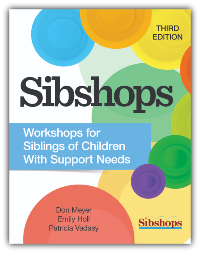Spotlight on Sibshops: Fun Workshops for Siblings of Children with Support Needs
January 16, 2024
How can parents and professionals meet the needs of siblings of children with support needs—and ensure that their unique challenges, emotions, and concerns are addressed? One of the best ways to support siblings is to connect them with their peers, and that’s where Sibshops come in.
Today we’ll take a look at the new third edition of Sibshops: a complete guide to planning peer support, informational, and recreational activities for siblings ages 8 through 17. Learn the basics and the benefits of Sibshops in this FAQ!
What are Sibshops, and how do children benefit from them?
Sibshops are best described as opportunities for siblings of children with special health, mental health, and developmental needs to obtain peer support and education within a recreational context.
Sibshops aim to:
- give siblings of children with support needs an opportunity to meet other siblings in a relaxed setting
- provide siblings with opportunities to discuss common joys and concerns with other siblings of children with support needs
- offer siblings an opportunity to learn how others handle situations commonly experienced by siblings of children with support needs
- help siblings learn more about the implications of their sibling’s support needs
- provide parents and other professionals with opportunities to learn more about the concerns and opportunities frequently experienced by siblings of people with support needs.
Sibshops are lively celebrations of the many contributions made by brothers and sisters of kids with support needs. Sibshops acknowledge that being the brother or sister of a person with special needs is for some a good thing, for others a not-so-good thing, and for many something in between. They reflect a belief that siblings have much to offer one another—if they are given a chance.
Sibshops are not therapy, group or otherwise, although their effect may be therapeutic for some children. Sibshops acknowledge that most brothers and sisters of people with support needs, like their parents, are doing well, despite the challenges posed by a family member’s illness or disability. Although Sibshop facilitators always keep an eye open for participants who may need additional services, the model takes a wellness approach that encourages children to recognize and build on their skills, talents, and strengths.
What kinds of activities take place during a Sibshop?
The Sibshop model intersperses information and discussion activities with games (designed to be unique, upbeat, and appealing to a wide ability range), cooking and craft activities, and special guests who may teach participants how to mime, how to juggle, or, in the case of one guest artist who has cerebral palsy, how to paint by holding a toothbrush in your mouth. Sibshops are as fun and rewarding for the people who host them as they are for the participants.
Who attends Sibshops?
Originally developed for 8- to 13-year-old siblings of children with developmental disabilities, the Sibshop model is easily adapted for slightly younger children and older teens. It has been adapted for siblings of children with other special needs, including cancer and other health impairments, hearing loss, and mental health concerns. Sibshops have also been adapted for use with children who have siblings involved in the foster care or juvenile justice systems, or who have lost a family member.
Children who attend Sibshops come from diverse setttings, including suburban communities, urban communities, rural areas, and areas with unique cultural heritages (e.g., Alaska, Hawaii, South Central Los Angeles).
Who sponsors Sibshops?
Any agency serving families of children with special needs can sponsor a Sibshop, provided it can offer financial support, properly staff the program, and attract a sufficient number of participants. We strongly recommend, however, that agencies consider working together to cosponsor a local Sibshop for all the siblings in a given community.
Sibshops are well within the reach and abilities of most communities. They are not expensive to run and logistically are no more difficult to coordinate than other community-based programs for children such as Scouts or Camp Fire.
Who runs Sibshops?
Sibshops are best facilitated by a team that includes service providers (e.g., social workers; special education teachers; physical, occupational, and speech therapists; nurses; child life specialists; etc.) and adult siblings of people with support needs. At the very least, the team of facilitators will need to
- be knowledgeable about the disability or illness represented
- possess a sense of humor and play
- enjoy the company of children
- respect the young participants’ expertise on the topic of life with a sibling with support needs





Write a Comment
Your email address will not be published. Required fields are marked *
Post a Comment